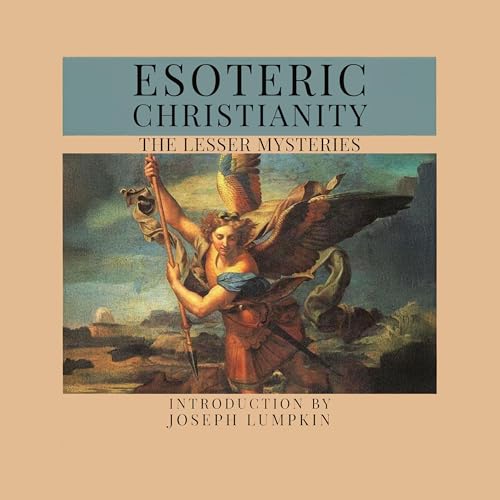
Esoteric Christianity or the Lesser Mysteries
Introduction by Joseph Lumpkin
No se pudo agregar al carrito
Add to Cart failed.
Error al Agregar a Lista de Deseos.
Error al eliminar de la lista de deseos.
Error al añadir a tu biblioteca
Error al seguir el podcast
Error al dejar de seguir el podcast
Obtén 3 meses por US$0.99 al mes
 Exclusivo para miembros Prime: ¿Nuevo en Audible? Obtén 2 audiolibros gratis con tu prueba.
Exclusivo para miembros Prime: ¿Nuevo en Audible? Obtén 2 audiolibros gratis con tu prueba.
Compra ahora por $19.95
-
Narrado por:
-
Michael Hacker's voice replica
-
De:
-
Joseph Lumpkin

Este título utiliza una réplica de la voz del narrador
Welcome to one of the first great texts written to beckon the listener into a deeper search within the Christian faith. The book before you is based in Theosophy.
The·os·o·phy, meaning God-Wise (or wise in the ways of God), is a spiritual movement began in the early 1800s. Theosophy is any of a number of philosophies maintaining that a knowledge of God may be achieved through spiritual ecstasy, direct intuition, or special individual relations. The Theosophy movement was founded in 1875 as the Theosophical Society by Helena Blavatsky and Henry Steel Olcott (1832–1907).
The movement or belief system seems to be closely aligned with Christian Gnosticism. Knowing that this work will touch on Gnosticism, it is reasonable to look deeper into the basic beliefs and doctrines of Gnosticism. We will then allow the book itself to speak to the specifics of Theosophy and its relationship to Christianity.
Gnosticism refers to a religious system that is based on personal experience or perception. In a religious context, gnosis is mystical or esoteric knowledge based on direct participation with the divine. In most Gnostic systems, the sufficient cause of salvation is this "knowledge of" ("acquaintance with") the divine. It is an inward "knowing".
The two movements are integrated, in that the roots of Theosophy can be found in Gnosticism.
Theosophy, occult movement originating in the 19th century with roots that can be traced to ancient Gnosticism and Neoplatonism. The term theosophy, derived from the Greek theos (“god”) and sophia (“wisdom”), is generally understood to mean “divine wisdom.” The roots of Gnosticism may pre-date Christianity. Similarities exist between Gnosticism and the wisdom and mystery cults found in Egypt and Greece. Gnosticism contains the basic terms and motifs of Plato’s cosmology as well as the mystical qualities of Buddhism. Plato was steeped in Greek mythology, and the Gnostic creation myth has elements owing to this.
PLEASE NOTE: When you purchase this title, the accompanying PDF will be available in your Audible Library along with the audio.
©2025 Joseph Lumpkin (P)2025 Fifth Estate IncLos oyentes también disfrutaron:



